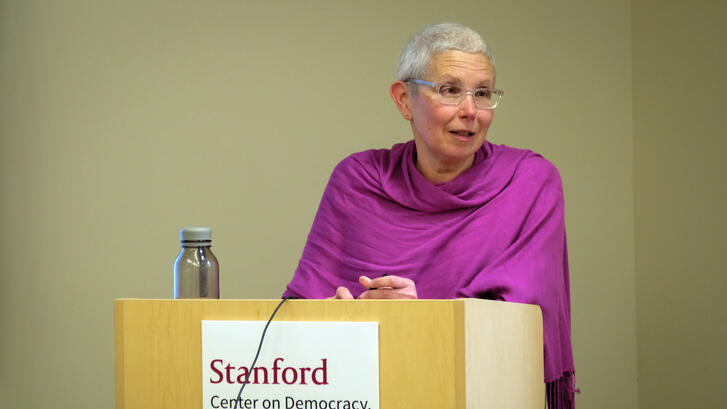Can Indigenous Political Autonomy Reduce Organized Crime? Insights from Mexico
Beatriz Magaloni, the Graham H. Stuart Professor of International Relations, presented her latest research during a CDDRL seminar talk.

Can indigenous communities ruling through politically autonomous institutions better protect against cartel takeover? In a CDDRL seminar series talk, Beatriz Magaloni, the Graham H. Stuart Professor of International Relations, a Senior Fellow at Stanford’s Freeman Spogli Institute for International Studies, and Director of CDDRL’s Poverty, Violence, and Governance Lab argued that in Mexico, indigenous communities ruled by traditional governance have proven more resilient against cartel takeovers than comparable municipalities relying on state-backed security provision.
Existing literature typically frames violence in developing countries as a manifestation of state weakness. But, in many areas of the world, organized criminal groups infiltrate the state, buying off intelligence, protection, and impunity.
In Mexico, cartels infiltrate local governments by funding political campaigns, killing those who refuse to be bought off. In this context, the selection of leaders through conventional Western multi-party elections is an effective vehicle through which cartels can extend their influence.
The capture of municipal political bodies is advantageous to cartels as it allows them to diversify their revenue generation. Access to intelligence, resources, and territory makes demanding regular payments and extracting natural resources far easier. It also allows cartels to gain discretionary power in the decision of who the state grants protection to or not. This bleak reality in which the borders between the state, organized crime, rule of law, and impunity are blurred elevates the urgency of investigating to what extent “opting out” of the state represents a viable alternative in the provision of security.
In Oaxaca and other regions across Mexico, indigenous communities have the right to govern autonomously. In their traditional form of governance, known as “usos y costumbres,” local elections and political parties are banned. Authorities are instead selected through community assemblies, in which decision-making is highly participatory. Based on this traditional governance, a growing number of indigenous communities have established community police groups, which are detached from the state and constituted by local community members with little or no professional police training.
Importantly, autonomous indigenous municipalities still receive state transfers and cannot be punished for opting out of the party system. In conducting extensive qualitative fieldwork, Magaloni sought to understand whether this traditional governance structure prohibits cartel infiltration and keeps communities safer.
The team hypothesized that higher levels of cartel presence would increase violence – which they proxied with homicide rates. They expected less cartel presence and less violence in Usos (autonomous indigenous communities) relative to party-controlled municipalities. Lower levels of police corruption and better deterrence against criminal cells were also expected for communities ruled by Usos.
The initial exploratory analysis showed that following the autonomous governance reform, Usos communities experienced a sharp decrease in violence. When the drug war began in 2006, these communities continued to see low levels of violence, whereas comparable municipalities suffered a sharp increase.
Magaloni employed a variety of difference in difference analyses to control for possible confounders. Usos communities were compared to similarly sized, similarly indigenous communities. Using a geographic discontinuity design, Usos were also compared to municipalities just 1 km from the border of Oaxaca – those ruled by multi-party elections. The analysis controlled for opium poppy suitability and history of ancestral governance practices.
The analysis confirmed that the more cartel presence, the more violence a community experienced. Across all models, the team was able to conclude that Usos communities saw significantly less cartel presence, fewer homicides, and less violence.
Magaloni’s work highlights the state's limitations in creating order in circumstances where criminal groups have compromised it. It also suggests that in the context of these predatory regimes, indigenous political autonomy can serve as a powerful rampart to the corrosive presence of organized crime.



